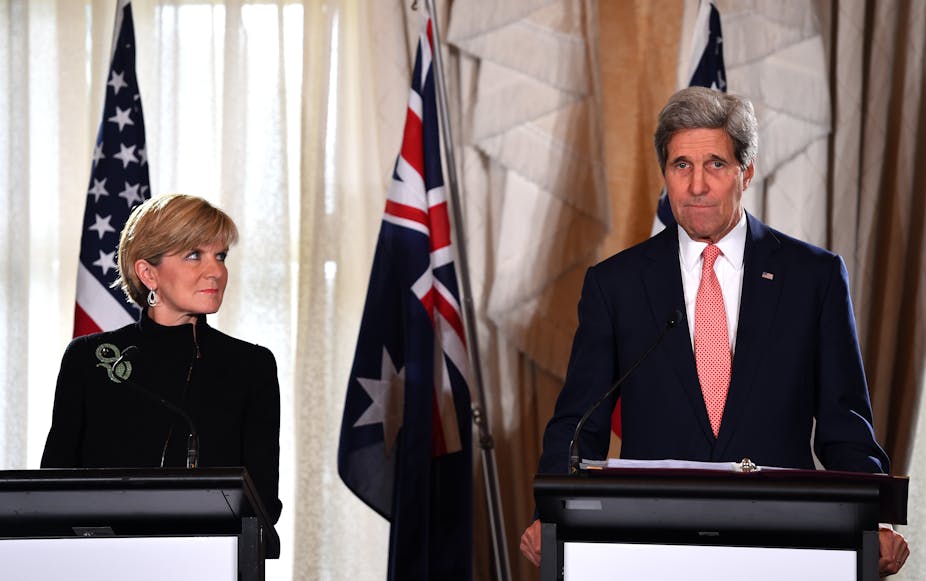Australia and the United States have agreed to take the issue of foreign fighters to the United Nations, as ASIO chief David Irvine today outlined an increasing local threat from Islamist extremists.
After today’s AUSMIN meeting, US Secretary of State John Kerry said the two countries intended to put foreign fighters “on the [UN] agenda in a way that will elicit support from the source countries as well as those countries of concern”.
The US and Australia “are going to work together to assemble a compendium of the best practices in the world today” to deal with the problem.
Irvine, in a speech to the Australian Institute of International Affairs tonight, said that Australians were involved with “the worst of the worst” extremist groups in Syria and Iraq and those returning “represent a serious threat”. But he also issued a warning against harming Australia’s multicultural harmony by blaming the Muslim community generally.
He said tens of Australian Islamist extremists had returned already. While some would disengage from extremist activities, others would hold an increased status, giving them the potential ability to radicalise others.
“We can anticipate that extremists will use Syria and Iraq as a safe haven to plan, train for and direct attacks in the west. What we have seen so far probably represents only the first manifestation of this threat,” he said.
Australians involved with extremist groups in Syria and Iraq had publicised “abhorrent acts of wanton viciousness” to both recruit others and spread panic and fear - often via social media – and then revelled in their notoriety.
Irvine, who retires as ASIO director-general next month, was speaking a day after the newspaper publication of a photo of the young son of Australian terrorist Khaled Sharrouf holding the severed head of a soldier in Syria.
Last week the federal government unveiled measures to strengthen the counter-terrorism effort, including the controversial retention for two years of metadata.
Irvine said Australians were now acting as “English-language extremist propagandists, accessing audiences and contacts they could not have dreamed of before social media to connect them.
"They, and other predatory radicalisers, continue to target often already alienated individuals, isolating and then grooming and further radicalising them – with the conflicts in Syria and Iraq central in their narrative whilst doing so.”
Another trend was the youth of those attracted to Islamist extremism, as shown by the recent suicide bombing allegedly undertaken by an Australian teenager from the suburbs of Australia fighting for a terrorist organisation in a land he barely knew.
These terrorist organisations were willing to sacrifice young brain-washed souls for a distorted, hate-filled interpretation of Islam, Irvine said.
This was the second Australian Islamist extremist suicide bomber in Syria and Iraq in less than a year. Before then, Australia had not seen one.
“It is of concern that so many Australians are actively choosing allegiance with the most extreme groups, seemingly drawn by the group’s uncompromising violent ideology, nihilistic intent and (the now realised) desire to re-establish an Islamic Caliphate, a concept rejected or ignored by most mainstream Muslims.”
While terrorism was not new and covered a range of threats, the threat to Australia and its interests from terrorism undertaken by Islamist extremists and the evolution of those involved, most concerned ASIO at the moment.
Australia continued to be a target. There had been planning for attacks over the past decade – which would have caused significant loss of life had they succeeded.
For a long time the principal concerns were home-grown “lone wolf” or small extremist cells externally influenced but operating in Australia.
While these were still of concern, the Syria and Iraq conflicts were adding to the challenge in a more fundamental way. These had created a new hub for Islamist extremists and were creating a new generation.
“The number of Australians who have sought to take part in the Syria and Iraq conflicts, or have sought to support extremists fighting there, is unprecedented.”
About 150 Australians had become involved with Islamist extremists in Syria and Iraq, by travelling there, attempting to do so, or supporting groups there from Australia.
These were social media wars. “Extremist use this new media to disseminate their message, interactively bringing their gory barbarity back to Australia, with the aim of radicalising young Australians in real time as they sit at home or wait for buses and trains in the morning.”
Irvine said that any threats to Australian interests was exacerbated by the number of South East Asians fighting in Syria and Iraq, which could re-energise the threat in our region.
But he stressed the Australian public “should not become paranoid and jump at the shadows of immediate, impending or inevitable catastrophe”.
He emphasised the importance of not shifting blame to the Muslim community.
“Violent Islamist extremism maintains a very small level of support amongst the fringe of the Muslim community here in Australia. Those involved here tend to operate outside of the mainstream Muslim orthodoxy in a smattering of locations across Australia.
"In no way are they representative of the overwhelming majority of Australian Muslims, who consider their activities to be abhorrent and offer no support to them,” he said.
“We should not let the phenomenon of violent Islamist extremism destroy the community harmony that is such an essential characteristic of Australia’s highly successful multicultural democracy. Nor should we be critical of a whole community based on the actions of a tiny minority of misguided individuals.
"In my experience the overall leadership of the community of Muslim Australians in dealing with these issues, always in their own quiet way, has been outstanding.
"The Australian Muslim community has made, and will continue to make, its own valuable contributions to our national character, our national livelihood, our national security and to our national cohesion,” he said.
“We are not fighting Islam, in Australia or anywhere else. We are fighting terrorism that kills innocent people, both Muslim and non-Muslim.”

